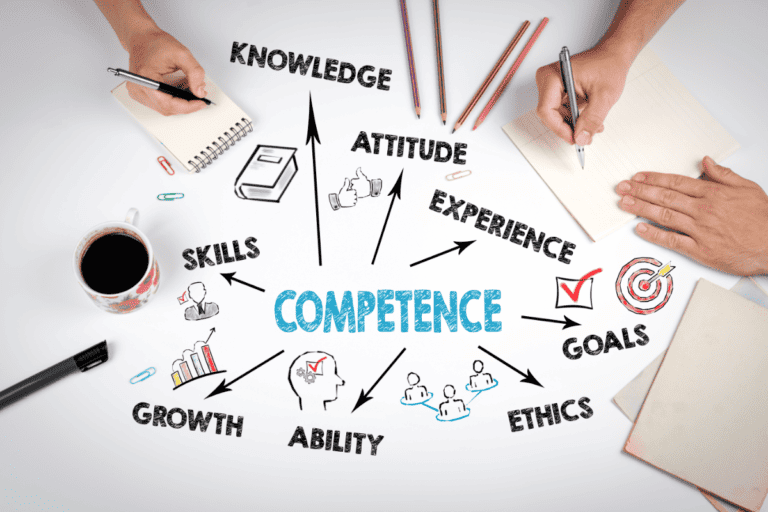Cognitive Flexibility as a Soft Skill
In the fast-paced workplace, cognitive flexibility is an essential soft skill. It enables you to adapt seamlessly to new challenges, think innovatively, and switch between tasks efficiently. Developing this skill involves swift pivoting, critical thinking, and exposure to diverse viewpoints. In problem-solving, it means embracing change, decision-making agility, and considering various scenarios. Enhancing creativity is about brainstorming, adapting perspectives, and welcoming uncertainty. In relationships, it's adjusting behaviors, empathetic listening, and effective collaboration. This skill is key for personal growth, resilience building, and maneuvering uncertainties. Its importance lies in empowering you to excel in today's ever-evolving work environment.
Key Takeaways
- Cognitive flexibility enhances adaptability in dynamic workplaces.
- It fosters innovative thinking and creative problem-solving skills.
- Critical for switching tasks, considering diverse perspectives, and open-mindedness.
- Cultivated through practice, exposure to diverse experiences, and embracing ambiguity.
- Essential soft skill for resilience, personal growth, and effective interpersonal relationships.
The Importance of Cognitive Flexibility
Understanding the importance of cognitive flexibility is vital for maneuvering through complex challenges in today's rapidly evolving work environment. Workplace adaptability, innovative thinking, mental agility, and open-mindedness are essential components of cognitive flexibility. In a dynamic workplace setting where change is constant, those who can adapt quickly and think creatively are more likely to thrive.
Workplace adaptability involves being able to adjust to new situations, environments, and demands. It requires a willingness to embrace change and a proactive approach to solving problems. Innovative thinking goes hand in hand with adaptability, as it involves generating new ideas and approaches to tackle challenges. Mental agility allows individuals to switch between different tasks, thoughts, and strategies effectively. Open-mindedness is vital for considering diverse perspectives and being receptive to new concepts.
Developing Cognitive Flexibility Skills
To enhance your cognitive flexibility skills, focus on honing your ability to pivot swiftly in response to changing circumstances and embrace novel ways of thinking and problem-solving. Critical thinking is essential in this process. It involves analyzing situations from multiple perspectives, questioning assumptions, and evaluating evidence to make well-informed decisions.
Practice decision-making by intentionally exposing yourself to diverse experiences and viewpoints. This exposure can help broaden your mental frameworks and challenge existing beliefs, contributing to your cognitive flexibility development.
Developing cognitive flexibility also requires adaptability in the face of uncertainty. Embrace ambiguity and seek opportunities to learn from unexpected outcomes. By cultivating a growth mindset, you can view challenges as opportunities for growth rather than setbacks. Remember that cognitive flexibility isn't a fixed trait but a skill that can be cultivated over time through deliberate practice and reflection.
Stay open to feedback and be willing to adjust your strategies based on new information. By continuously refining your critical thinking and decision-making abilities, you can enhance your cognitive flexibility and thrive in dynamic environments.
Cognitive Flexibility in Problem-Solving
When approaching problem-solving tasks, remember the importance of adapting to new challenges, thinking from different angles, and embracing diverse perspectives.
By incorporating cognitive flexibility into your problem-solving process, you can enhance your ability to generate innovative solutions and overcome obstacles more effectively.
Cultivating these skills won't only improve your problem-solving capabilities but also contribute to your overall success in maneuvering through complex situations.
Adapting to New Challenges
Adapting to new challenges requires a mindset that embraces change and values creative problem-solving approaches. In the face of uncertainty, resilience becomes essential. Being able to navigate through ambiguous situations with confidence and composure is a hallmark of cognitive flexibility.
Quick decision-making plays a pivotal role in this process. When confronted with unexpected obstacles, the ability to make swift and effective decisions can be the differentiating factor between success and failure. By honing this skill, individuals can respond promptly to evolving circumstances and seize opportunities that may arise amidst challenges.
Embracing change with a proactive and adaptable approach enables individuals to stay ahead of the curve and excel in problem-solving scenarios that demand agility and innovation.
Thinking From Different Angles
Embracing diverse perspectives is essential in problem-solving scenarios, showcasing cognitive flexibility at its best. When thinking from different angles, it's important to engage in critical thinking and analytical reasoning to arrive at innovative solutions.
Here are four key strategies to enhance your cognitive flexibility in problem-solving:
- Challenge Assumptions: Questioning underlying beliefs can open up new possibilities and alternative solutions.
- Seek Feedback: Actively solicit input from others to gain fresh insights and perspectives on the issue at hand.
- Brainstorm Creatively: Encourage unconventional idea generation to explore a wide range of potential solutions.
- Consider Multiple Scenarios: Evaluate different scenarios to anticipate potential outcomes and make more informed decisions.
Embracing Diverse Perspectives
To excel in problem-solving scenarios by showcasing cognitive flexibility at its best, engage in critical thinking and analytical reasoning, opening up new possibilities and alternative solutions through questioning underlying beliefs.
Embracing diverse perspectives involves open-minded thinking and making empathy-driven decisions. By incorporating cross-cultural understanding and practicing inclusive leadership, you broaden your problem-solving toolkit.
Open-minded thinking allows you to contemplate a wide range of viewpoints, leading to innovative solutions. Empathy-driven decisions help you understand the needs and motivations of others, enabling you to tailor your problem-solving approach effectively.
Cross-cultural understanding fosters collaboration and creativity by leveraging different cultural perspectives. Inclusive leadership guarantees that all voices are heard and valued, creating a supportive environment for diverse ideas to flourish.
Enhancing Creativity Through Cognitive Flexibility
To enhance your creativity through cognitive flexibility, start by actively brainstorming for new ideas and solutions.
Embrace change and be willing to adapt your perspectives and approaches to different situations.
Brainstorming for Ideas
Enhance your creative thinking by leveraging cognitive flexibility to generate innovative ideas efficiently. When it comes to brainstorming for ideas, incorporating cognitive flexibility can greatly enhance your creative process. Here are four strategies to help you boost your brainstorming sessions:
- Embrace Diverse Perspectives: Encourage team members with different backgrounds and expertise to contribute unique ideas.
- Combine Analogies: Connect unrelated concepts to spark new and innovative solutions.
- Mindful Reflection: Take breaks during brainstorming sessions to reflect on ideas and allow for new insights to emerge.
- Experiment with Visualization Techniques: Use visual aids such as mind maps or mood boards to stimulate creativity and explore ideas from different angles.
Adapting to Change
Adapting to change requires a mindset that embraces uncertainty and values flexibility in maneuvering evolving circumstances. In the area of change management, the ability to move smoothly in times of uncertainty is a valuable skill. Individuals with cognitive flexibility excel in moving through changes, displaying resilience in the face of challenges.
By embracing uncertainty as an opportunity for growth and innovation, one can enhance their creativity and problem-solving abilities. When confronted with changes, those who possess cognitive flexibility are adept at adjusting their perspectives and approaches, leading to effective solutions and outcomes.
Through the strategic application of cognitive flexibility, individuals can't only survive but thrive in dynamic environments, turning changes into opportunities for advancement.
Cognitive Flexibility in Interpersonal Relationships
In maneuvering interpersonal relationships, having cognitive flexibility allows individuals to adeptly adjust their perspectives and behaviors based on varying social cues and dynamics. This skill is essential in traversing the complexities of human interactions and fostering healthy relationships.
Here are four key aspects where cognitive flexibility plays an important role:
- Conflict Resolution: Cognitive flexibility enables you to ponder multiple viewpoints and find common ground, facilitating effective conflict resolution strategies.
- Communication Skills: By being cognitively flexible, you can adapt your communication style to different personalities and situations, enhancing the clarity and effectiveness of your message.
- Emotional Intelligence: Cognitive flexibility is closely linked to emotional intelligence, as it involves understanding and managing emotions in yourself and others to build stronger connections.
- Empathy Building: Through cognitive flexibility, you can better empathize with others by stepping into their shoes, comprehending their perspectives, and responding with compassion.
Cognitive Flexibility for Personal Growth
For personal growth, cognitive flexibility plays a pivotal role in adapting to new challenges and expanding one's perspectives. Developing a growth mindset is essential for fostering self-discovery and personal development. By embracing cognitive flexibility, individuals can navigate through uncertainties and setbacks with resilience, ultimately leading to a deeper understanding of themselves and the world around them.
In the journey of personal growth, the ability to adjust one's thinking patterns and behaviors enables individuals to explore new opportunities, confront obstacles, and adapt to changing circumstances. This adaptability is vital for fostering self-discovery as it allows individuals to break free from rigid thinking patterns and embrace novel experiences that contribute to their personal development.
Moreover, cognitive flexibility serves as a cornerstone for building resilience. When faced with challenges and failures, individuals with a high level of cognitive flexibility can bounce back more effectively, learn from their experiences, and grow stronger in the process. By cultivating this skill, individuals can proactively shape their personal growth journey, leading to a more fulfilling and enriched life.
Conclusion
To sum up, cognitive flexibility isn't just a skill, it's a powerful tool that can shape your personal and professional success. By honing your ability to adapt, problem-solve, and think creatively, you can navigate challenges and seize opportunities with ease.
Embracing cognitive flexibility opens doors to new possibilities and growth, positioning you for greater achievements and fulfillment. So, why wait? Start cultivating this invaluable soft skill today and watch how it transforms your life.








